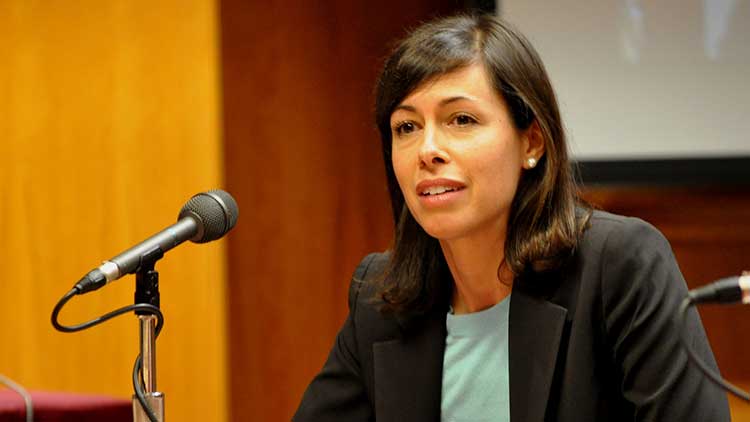FCC's Rosenworcel to Senate: U.S. Lacks Comprehensive 5G Plan

The smarter way to stay on top of broadcasting and cable industry. Sign up below
You are now subscribed
Your newsletter sign-up was successful
FCC commissioner Jessica Rosenworcel looked to throw a scare into the Senate Homeland Security and Governmental Affairs Committee about the country's 5G-readiness.
That came at a hearing on the national security risks, supply chain security, an promise of 5G.
Sen. Ron Johnson (R-Wis.), chairman of the committee, said at the hearing that he had a briefing and subsequent call with Larry Kudlow, director of the National Economic Council, Oct. 30 and now was confident the council was taking the lead on the 5G issue, with the "involvement" of FCC chair Ajit Pai and President Donald Trump and that the Administration had a handle on the problem.
Christopher Krebs, director of the Cybersecurity and Infrastructure Security Agency at the U.S. Department of Security, also signaled the Administration has been hard at work on 5G supply chain security "for years," and that there was a nationwide strategy that was "Really coming together" under the guidance of the National Economic Council and the National Security Council. He said while there is no Department of 5G or Department of Supply Chain Security, "nor should there be, I can say with confidence that the United States is collaborating effectively across agencies and with our industry partners."
Ranking member Sen. Gary Peters (D-Minn.) saw it differently, saying the FCC lacked a coordinated plan to secure 5G networks, saying the government's efforts had been "piecemeal and disorganized," and without dedicated leadership" or the needed coordinated national strategy.
Sen. Mitt Romney (R-Utah) agreed with Peter that the U.S. does not have a strategy and was responding on an ad hoc basis. He said there was not even a process underway for how to deal with a nation that breaks the rules.
Rosenworcel definitely agreed. She said that the U.S. "does not have a comprehensive national plan in place with a fully coordinated interagency response" given that the Defense Innovation Board, which advises the U.S. military, issued the warning that "the country that owns 5G will own innovations and set the standards for the rest of the world," and "that country is currently not likely to be the United States."
The smarter way to stay on top of broadcasting and cable industry. Sign up below
NTIA Chief: We Are Winning Race to 5G
Rosenworcel had some ideas for such a comprehensive national plan: 1) Secure the supply chain; 2. recognize that securing the U.S. supply will only go so far because "no network stands alone," so it was important to virtualize 5G networks so they resided in the cloud, a space the U.S. dominates; 3. smarter spectrum policy (auction more midband); and 4. secure the internet of things.
Rosenworcel suggested in expanding on the security issue that after "inexplicable delays," and perhaps because of the hearing this week, Pai had just announced a vote on a supply chain security item at the next meeting and that the FCC needs to use that proceeding to get a better handle on where suspect tech is.
She also said it had been a mistake for the FCC to focus on high-band spectrum rather than speeding more mid-band spectrum for 5G. Rosenworcel said the U.S. has rested on 4G laurels, and that was not "a good place to sit."
Robert Strayer, deputy assistant secretary for cyber and international communications and information policy at the State Department, said one holdup in getting more midband spectrum used for 5G is the holdup of the T-Mobile-Sprint merger by a court case. DOJ has approved the deal with conditions meant so spur the deployment of 5G.
The FCC supply chain proposal also included seeking comment on how to "rip and replace" existing suspect equipment from U.S. 4G networks and how to help networks pay for that retrofit.
Rosenworcel said the FCC needs to seek comment on where the equipment is before they decide "what dollars we make available to rip and replace it." Currently, the FCC is targeting equipment paid for by government broadband subsidy dollars.
Peters asked Krebs that if the FCC does proceed with a rip and replace approach to tech from ZTE and Huawei, whether that should apply to "all equipment without exception."
Krebs said that, if Peters was talking about, "globally, across the United States and every environment," he would "hesitate to go that far." He said the U.S. needed to look at where the risk "truly is."
Then there was the issue of where to find the trusted tech, given that foreign, suspect, companies dominate that space. Johnson dropped in a comment about the Federal Trade Commission's ongoing lawsuit against Qualcomm, one of the few U.S.-based companies whose tech (chips) is integral to 5G tech. Johnson said that had him "scratching his head."
Strayer signaled there was some movement on the U.S. 5G tech front, even if the companies doing it were based in Europe.
He cited new manufacturing by Ericksson in Florida and Samsung fabrication of chips in Austin, Texas. He said the problem was that China's tech was massively subsidized by the government.
Contributing editor John Eggerton has been an editor and/or writer on media regulation, legislation and policy for over four decades, including covering the FCC, FTC, Congress, the major media trade associations, and the federal courts. In addition to Multichannel News and Broadcasting + Cable, his work has appeared in Radio World, TV Technology, TV Fax, This Week in Consumer Electronics, Variety and the Encyclopedia Britannica.

